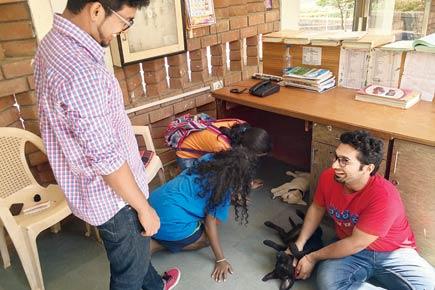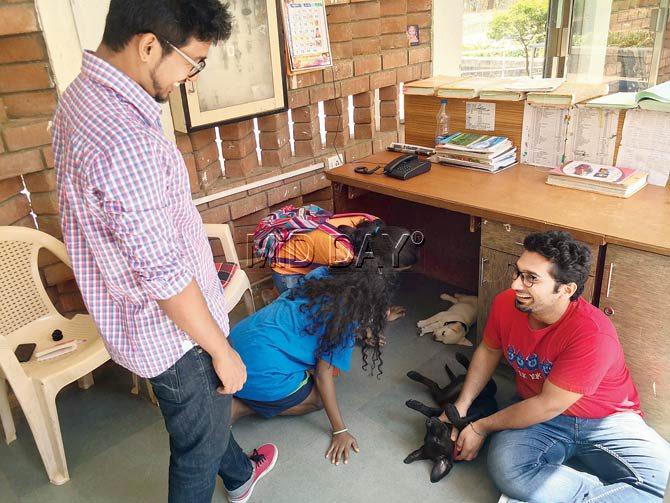Yen, Euro, Pound and Dollar are labrador pups enlisted as stress busters for students at Pune’s Symbiosis International University. However, a local breed could have done the same, says the dog community

On February 15, 2016, Dr Vidya Yerwadekar — principal director of Symbiosis Society and Vice-Chancellor of Symbiosis University — gifted four labrador puppies to the Yewale and Viman Nagar campuses. They have met with the hearty response predicted for all things small and furry.
ADVERTISEMENT

Purnet Moirangthem (standing) is not familiar with dogs and admits he is wary of Labradors, “though it’s just psychological”. Pics/Mitali Parekh
Students who have left their pets behind at home, gather for a cuddle and game in and out of the hostel. Dollar (black) and Pound (fawn) are housed in room number 243 of the boys’ hostel at the Yewale campus. After they grow a little, Pound will live at the girls’ hostel. The hostel wardens — Manisha Gaikwad and Ravindra Bodake — walk them every morning and evening for 45 minutes and 30 minutes respectively and oversee medication and feeding. There is a sign tacked to the board that prevents them from walking out, saying the dogs are not to be picked up. “The students kept picking them up and we noticed signs of discomfort, especially in Pound just after he had eaten,” says Lt Colonel (Retd) S Atholi, campus administrator of the Hill Top Lavale campus, who sent out a circular requesting students to not feed the puppies and refrain from picking.
 Dum dum, the stray campus pup who passed away, has been commemorated on the university’s student design project, including this varsity jacket; Pound hangs around the boys’ hostel on the Lavale campus
Dum dum, the stray campus pup who passed away, has been commemorated on the university’s student design project, including this varsity jacket; Pound hangs around the boys’ hostel on the Lavale campus
“The campus has 1,500 students and they play with the puppies from 6 pm to 10 pm. Labradors need five km to eight km of walking every day, and when they grow up, just the walk from the Hill Top campus to the Hill Base — which is 2.5 km one way — will provide enough exercise.”
This is great in theory, and many people do gather to the boys’ hostel to play with the puppies, who at 1.5 months of age, spend most of their time sleeping. But, a breed of intuitive dog lovers are just as happy playing with the Indie and pariah dogs who live on the campus, including Amrutha Moorthy, Zarna Thakker and Akshay Julka. “The strays are as loved as these purebreds,” says Zarna loyally, who is studying for an MBA in innovation. She’s talking about Shakira who hangs around the hostels. She recently gave birth to a litter of six pups, all but one of which died due to a heat-related illness.
The last serving puppy, Dum Dum, recently succumbed to gastroenteritis. Zarna, who used to intern with a veterinarian during her college years, took it to the vet, but it was too late. Dum Dum has been commemorated on a design project of memorabilia and tchotchkes for the college.
Amrutha Moorthy, from Bengaluru, who is pursuing an MBA in Brand Communication, also spends time with the dogs who live on the campus. She reasons that pedigree dogs, who have been kept with the specific purpose of interaction with students, could assuage fears of those not used to dogs. Purnet Moirangthem from Manipur, who is doing a Masters degree in Film, confirms this. He hasn’t grown around animals and says, “I don’t know how a stray dog will react to a human. I have seen them behave violently. They must be terrified of what a human can do to them and since I don’t know how to read them, I am afraid I might threaten them unknowingly. So, I am more comfortable around a pedigree.”
Yerwadekar, who has a labrador at home, says she chose the breed because they are more docile. “They are easier to maintain. We brought them from a friend and have ex-Army officers on campus who will take care of them and give them domestic training so that they remain friendly and learn some commands.” She says there are strays on various campuses that they have “practically adopted,” with members of faculty taking charge of their vaccinations.
“Local dogs play the role of a therapist, without the formal designation or recognition,” says canine behaviourist Shirin Merchant, who is the only person outside Europe to be accredited by the Kennel Club of England in advanced Companion Dog training and Behavioural Training.
“People will tell you of a dog in their colony whom the watchman takes cares of, but who also gives them love and acts as a stress buster. For this role, you need a dog who truly enjoys human company and not just tolerates it,” she says. “It could belong to any breed. Local breeds such as pariahs and InDogs have an advantage over delicate purebreds in that they are more suited to the climate and have a stronger constitution. They also have an edge of innate intelligence — they know how to cross a road or to keep away from a human’s plate of food because they rely on this skill; pedigree dogs have to be taught this. Put a Labrador on the road and it will head straight for the traffic.”
Buying of dogs encourages an unregulated breeder eco-system that NGOs are trying to fight. The reasons are unethical and abusive methods of breeding and an unhygienic environment in which the puppies and parents are kept. Another concern is that of population control, especially with the number of dogs abandoned each week when humans can’t cope with their growth activity such as teething and hyperactivity. Yerawdekar says she hasn’t really thought about their sterilisation “since they are just puppies”.
It’s a move those interested in animal rights activists hope a leading institute like Symbiosis will make, to set an example.
 Subscribe today by clicking the link and stay updated with the latest news!" Click here!
Subscribe today by clicking the link and stay updated with the latest news!" Click here!






